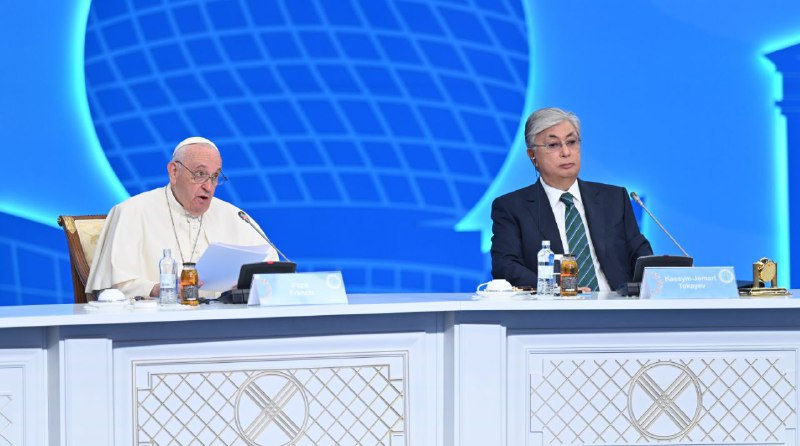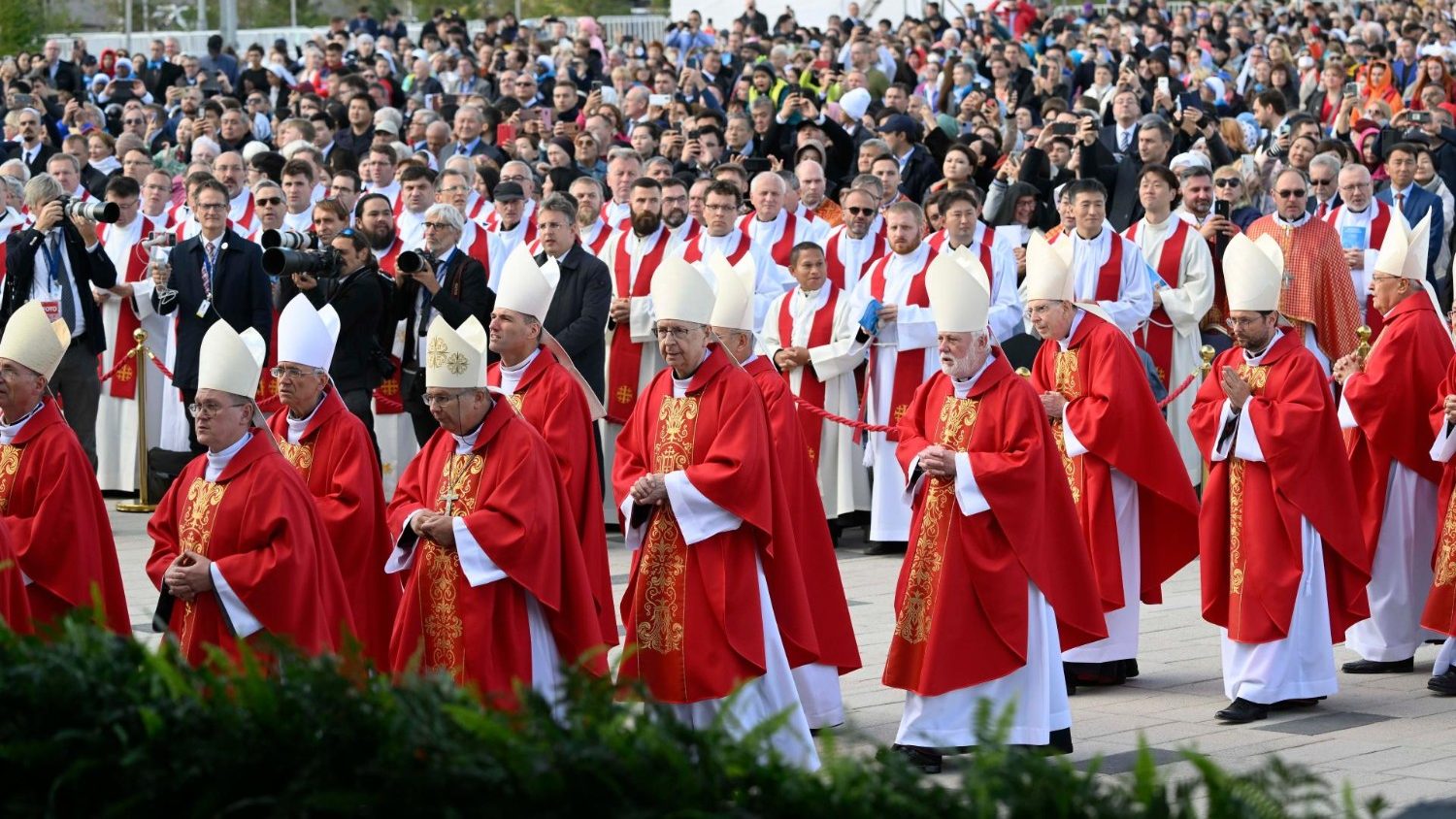NUR-SULTAN – The first day of the seventh Congress of Leaders of World and Traditional Religions started with an organized panel on the role of religious leaders in the spiritual and social development of humankind in the post-pandemic period followed by an award ceremony dedicated to the contribution to interfaith dialogue and concluded with Pope Francis celebrating the Holy Mass with thousands of Catholics on Sept. 14 in Nur-Sultan.

Pope Francis and President Tokayev. Photo credit: President’s press service
The congress speakers expressed their deep concern over the continuing military conflicts, the continued fragmentation of society, and governments’ negligence in cultivating spiritual values.
President Kassym-Jomart Tokayev welcomed the congress delegates in Kazakhstan, the land that became “a bridge between West and East.” The Kazakh leader highlighted the importance of humanistic ideals of world religions in building a new international security model for resolution of conflicts around the world.
“The Quran, the Bible, the Torah, and other scriptures are imbued with ideas of humanism, compassion, and mercy,” said Tokayev. “The high mission of religious leaders in the modern era is to bring these fundamental truths to the people.”
The panel continued with Pope Francis, who began his speech by quoting the renowned Kazakh poet and thinker Abai whose writings “steeped in religious devotion and reflect the noble soul of this people.” “We need, as Abai says, to keep ‘the soul alive and the mind clear,’” said the Pope quoting the word number six from Abai’s “Book of Words.”
“The pursuit of transcendence and the sacred value of fraternity can inspire and illumine the decisions that need to be made amid the geopolitical, social, economic, ecological, but fundamentally spiritual crises that many modern institutions, including democracies, are presently experiencing, to the detriment of security and concord among peoples. We need religion to respond to the thirst for world peace and the thirst for the infinite that dwells in the heart of each man and woman,” said the Pope.
The Pope said that religious freedom is an essential condition for genuinely human and integral development. He also called for solidarity towards those in need in a post-pandemic world.
Among the most pressing global challenges, Pope Francis highlighted the challenge of peace. The scourge of war and confrontation still plagues the world, he said. This requires a “leap forward” by the great religions to actively unite and commit to peace, the Pope said.
The final challenge, according to the Pope, is care for our common home. “Against extreme climate changes, we need to protect the natural environment, so that it will not fall prey to profiteering, but be preserved for future generations, to the praise of the Creator,” he said.
Speaking at the plenary session of the congress, Egypt’s Grand Imam of al-Azhar Sheikh Ahmed al-Tayeb emphasized the importance of “religious brotherhood.”
“Religious brotherhood is a prerequisite for global international brotherhood,” he said. “I do not call for merging all religions into one – we are convinced that this idea is destructive and removes the roots of religion. I call for serious work to strengthen the values of all religions.”
Continuing this theme, Russian Orthodox Metropolitan Anthony of Volokolamsk, said that “the task of the interreligious forum is precisely that we should overcome divisions and be able to act together over the barriers that divide our traditional religions.”
The speaker also stressed the point that religion exists beyond political boundaries. “The dialogue of religions, the widespread development of religious education, the unity of believers on the basis of moral foundations – this is the best answer to the challenges of our time,” said the Russian Orthodox Metropolitan.
Sephardic Chief Rabbi of Israel Yitzhak Yosef spoke on the topic of inter-religious respect and provided a practical example of kindness, followed by a video address by Secretary-General of the United Nations (UN) António Guterres who, in turn, urged congress participants to use their moral voice and spiritual authority to promote mutual respect, compassion, and unity.
The congress also featured speeches from Theophilus III, Most Holy and Blessed Patriarch of the Holy City of Jerusalem, all of Palestine, Arabia, Syria, the Onpol (two shores) of Jordan, Holy Zion and Cana of Galilee, Abdullatif bin Abdul Aziz bin Abdrahman Al-Asheikh, Minister of Islamic Affairs, Dawah, and Guidance of Saudi Arabia, Miguel Ángel Moratinos, UN Under-Secretary General and High Representative of the UN Alliance of Civilizations, and Li Guangfu, President of the Chinese Taoist Association.
In the afternoon, Pope Francis held the Holy Mass (prayer service) for thousands of Catholic believers, including pilgrims who arrived in the capital of Kazakhstan.

Holy Mass at the “Expo grounds”. Photo credit: vaticannews.va
“Today we celebrate the exaltation of the cross of Christ, for on its wood Jesus took upon himself all our sin and the evil of our world, and vanquished them by his love,” said Pope Francis addressing the members of Kazakhstan’s small Catholic community.
“Commitment is demanded on the part of all if Kazakhstan is to keep growing in ‘fraternity, dialogue and understanding… building bridges of solidarity and cooperation with other peoples, nations and cultures,’” he continued, citing Saint John Paul II’s words in his address at the welcome ceremony in September 2001.
The panel discussions on the second day of the congress will explore topics such as the role of religions in strengthening spiritual and moral values, religious education, countering extremism and terrorism, and the role of religious communities in supporting women’s social status.
